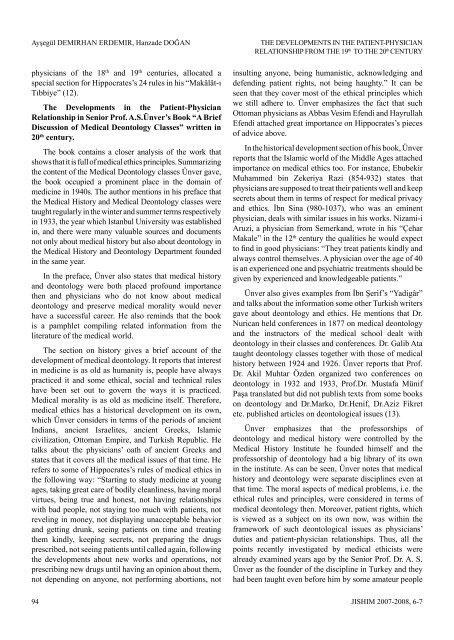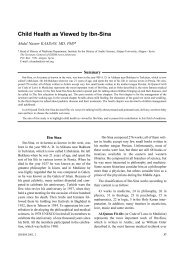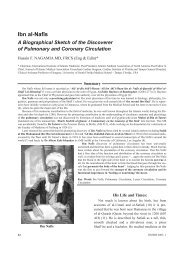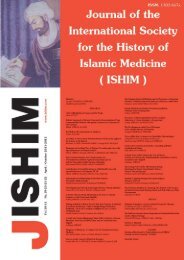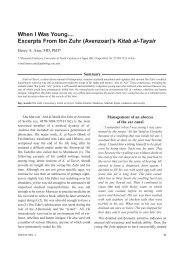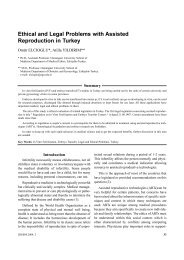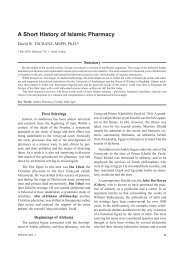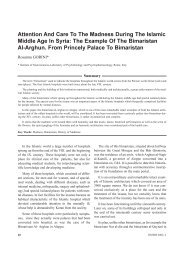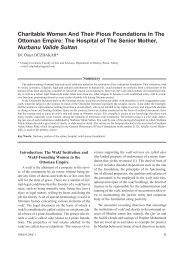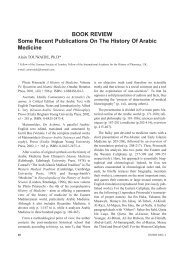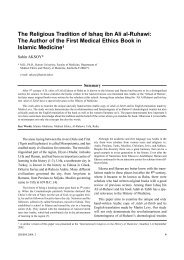Journal of International Society for the History
Journal of International Society for the History
Journal of International Society for the History
Create successful ePaper yourself
Turn your PDF publications into a flip-book with our unique Google optimized e-Paper software.
Ayşegül DEMIRHAN ERDEMIR, Hanzade DOĞAN THE DEVELOPMENTS IN THE PATIENT-PHYSICIAN<br />
RELATIONSHIP FROM THE 19 th TO THE 20 th CENTURY<br />
physicians <strong>of</strong> <strong>the</strong> 18th and 19th centuries, allocated a<br />
special section <strong>for</strong> Hippocrates’s 24 rules in his “Makâlât-ı<br />
Tıbbiye” (12).<br />
The Developments in <strong>the</strong> Patient-Physician<br />
Relationship in Senior Pr<strong>of</strong>. A.S.Ünver’s Book “A Brief<br />
Discussion <strong>of</strong> Medical Deontology Classes” written in<br />
20th century.<br />
The book contains a closer analysis <strong>of</strong> <strong>the</strong> work that<br />
shows that it is full <strong>of</strong> medical ethics principles. Summarizing<br />
<strong>the</strong> content <strong>of</strong> <strong>the</strong> Medical Deontology classes Ünver gave,<br />
<strong>the</strong> book occupied a prominent place in <strong>the</strong> domain <strong>of</strong><br />
medicine in 1940s. The author mentions in his preface that<br />
<strong>the</strong> Medical <strong>History</strong> and Medical Deontology classes were<br />
taught regularly in <strong>the</strong> winter and summer terms respectively<br />
in 1933, <strong>the</strong> year which Istanbul University was established<br />
in, and <strong>the</strong>re were many valuable sources and documents<br />
not only about medical history but also about deontology in<br />
<strong>the</strong> Medical <strong>History</strong> and Deontology Department founded<br />
in <strong>the</strong> same year.<br />
In <strong>the</strong> preface, Ünver also states that medical history<br />
and deontology were both placed pr<strong>of</strong>ound importance<br />
<strong>the</strong>n and physicians who do not know about medical<br />
deontology and preserve medical morality would never<br />
have a successful career. He also reminds that <strong>the</strong> book<br />
is a pamphlet compiling related in<strong>for</strong>mation from <strong>the</strong><br />
literature <strong>of</strong> <strong>the</strong> medical world.<br />
The section on history gives a brief account <strong>of</strong> <strong>the</strong><br />
development <strong>of</strong> medical deontology. It reports that interest<br />
in medicine is as old as humanity is, people have always<br />
practiced it and some ethical, social and technical rules<br />
have been set out to govern <strong>the</strong> ways it is practiced.<br />
Medical morality is as old as medicine itself. There<strong>for</strong>e,<br />
medical ethics has a historical development on its own,<br />
which Ünver considers in terms <strong>of</strong> <strong>the</strong> periods <strong>of</strong> ancient<br />
Indians, ancient Israelites, ancient Greeks, Islamic<br />
civilization, Ottoman Empire, and Turkish Republic. He<br />
talks about <strong>the</strong> physicians’ oath <strong>of</strong> ancient Greeks and<br />
states that it covers all <strong>the</strong> medical issues <strong>of</strong> that time. He<br />
refers to some <strong>of</strong> Hippocrates’s rules <strong>of</strong> medical ethics in<br />
<strong>the</strong> following way: “Starting to study medicine at young<br />
ages, taking great care <strong>of</strong> bodily cleanliness, having moral<br />
virtues, being true and honest, not having relationships<br />
with bad people, not staying too much with patients, not<br />
reveling in money, not displaying unacceptable behavior<br />
and getting drunk, seeing patients on time and treating<br />
<strong>the</strong>m kindly, keeping secrets, not preparing <strong>the</strong> drugs<br />
prescribed, not seeing patients until called again, following<br />
<strong>the</strong> developments about new works and operations, not<br />
prescribing new drugs until having an opinion about <strong>the</strong>m,<br />
not depending on anyone, not per<strong>for</strong>ming abortions, not<br />
insulting anyone, being humanistic, acknowledging and<br />
defending patient rights, not being haughty.” It can be<br />
seen that <strong>the</strong>y cover most <strong>of</strong> <strong>the</strong> ethical principles which<br />
we still adhere to. Ünver emphasizes <strong>the</strong> fact that such<br />
Ottoman physicians as Abbas Vesim Efendi and Hayrullah<br />
Efendi attached great importance on Hippocrates’s pieces<br />
<strong>of</strong> advice above.<br />
In <strong>the</strong> historical development section <strong>of</strong> his book, Ünver<br />
reports that <strong>the</strong> Islamic world <strong>of</strong> <strong>the</strong> Middle Ages attached<br />
importance on medical ethics too. For instance, Ebubekir<br />
Muhammed bin Zekeriya Razi (854-932) states that<br />
physicians are supposed to treat <strong>the</strong>ir patients well and keep<br />
secrets about <strong>the</strong>m in terms <strong>of</strong> respect <strong>for</strong> medical privacy<br />
and ethics. İbn Sina (980-1037), who was an eminent<br />
physician, deals with similar issues in his works. Nizami-i<br />
Aruzi, a physician from Semerkand, wrote in his “Çehar<br />
Makale” in <strong>the</strong> 12th century <strong>the</strong> qualities he would expect<br />
to fi nd in good physicians: “They treat patients kindly and<br />
always control <strong>the</strong>mselves. A physician over <strong>the</strong> age <strong>of</strong> 40<br />
is an experienced one and psychiatric treatments should be<br />
given by experienced and knowledgeable patients.”<br />
Ünver also gives examples from İbn Şerif’s “Yadigâr”<br />
and talks about <strong>the</strong> in<strong>for</strong>mation some o<strong>the</strong>r Turkish writers<br />
gave about deontology and ethics. He mentions that Dr.<br />
Nurican held conferences in 1877 on medical deontology<br />
and <strong>the</strong> instructors <strong>of</strong> <strong>the</strong> medical school dealt with<br />
deontology in <strong>the</strong>ir classes and conferences. Dr. Galib Ata<br />
taught deontology classes toge<strong>the</strong>r with those <strong>of</strong> medical<br />
history between 1924 and 1926. Ünver reports that Pr<strong>of</strong>.<br />
Dr. Akil Muhtar Özden organized two conferences on<br />
deontology in 1932 and 1933, Pr<strong>of</strong>.Dr. Mustafa Münif<br />
Paşa translated but did not publish texts from some books<br />
on deontology and Dr.Marko, Dr.Henif, Dr.Aziz Fikret<br />
etc. published articles on deontological issues (13).<br />
Ünver emphasizes that <strong>the</strong> pr<strong>of</strong>essorships <strong>of</strong><br />
deontology and medical history were controlled by <strong>the</strong><br />
Medical <strong>History</strong> Institute he founded himself and <strong>the</strong><br />
pr<strong>of</strong>essorship <strong>of</strong> deontology had a big library <strong>of</strong> its own<br />
in <strong>the</strong> institute. As can be seen, Ünver notes that medical<br />
history and deontology were separate disciplines even at<br />
that time. The moral aspects <strong>of</strong> medical problems, i.e. <strong>the</strong><br />
ethical rules and principles, were considered in terms <strong>of</strong><br />
medical deontology <strong>the</strong>n. Moreover, patient rights, which<br />
is viewed as a subject on its own now, was within <strong>the</strong><br />
framework <strong>of</strong> such deontological issues as physicians’<br />
duties and patient-physician relationships. Thus, all <strong>the</strong><br />
points recently investigated by medical ethicists were<br />
already examined years ago by <strong>the</strong> Senior Pr<strong>of</strong>. Dr. A. S.<br />
Ünver as <strong>the</strong> founder <strong>of</strong> <strong>the</strong> discipline in Turkey and <strong>the</strong>y<br />
had been taught even be<strong>for</strong>e him by some amateur people<br />
94 JISHIM 2007-2008, 6-7


